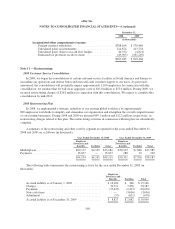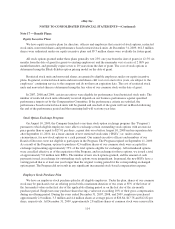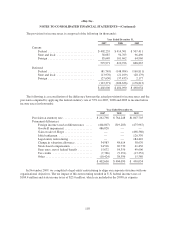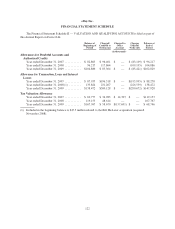eBay 2009 Annual Report Download - page 120
Download and view the complete annual report
Please find page 120 of the 2009 eBay annual report below. You can navigate through the pages in the report by either clicking on the pages listed below, or by using the keyword search tool below to find specific information within the annual report.eBay Inc.
NOTES TO CONSOLIDATED FINANCIAL STATEMENTS—(Continued)
and more may do so in the future. Trial for a group of four representative suits began in August 2009, and trial
for a group of 23 other suits began in September 2009. There is some precedent in Korea for a court to grant
“consolation money” for data breaches without a specific finding of harm from the breach. Such precedents have
involved payments of up to approximately $200 per user. On January 14, 2010, the court ruled that IAC had met
its obligations with respect to defending the site from intrusion and, accordingly, had no liability for the breach.
We expect this ruling to be appealed.
Other third parties have from time to time claimed, and others may claim in the future, that we have
infringed their intellectual property rights. We are subject to additional patent disputes, and expect that we will
increasingly be subject to patent infringement claims as our services expand in scope and complexity. In
particular, we expect that we may face additional patent infringement claims involving various aspects of our
Marketplaces and Payments businesses. We have in the past been forced to litigate such claims. We may also
become more vulnerable to third-party claims as laws such as the Digital Millennium Copyright Act, the Lanham
Act and the Communications Decency Act are interpreted by the courts, and as we become subject to laws in
jurisdictions where the underlying laws with respect to the potential liability of online intermediaries like
ourselves are either unclear or less favorable. We believe that additional lawsuits alleging that we have violated
copyright or trademark laws will be filed against us. Intellectual property claims, whether meritorious or not, are
time consuming and costly to resolve, could require expensive changes in our methods of doing business, or
could require us to enter into costly royalty or licensing agreements.
From time to time, we are involved in other disputes or regulatory inquiries that arise in the ordinary course
of business including suits by our users (individually or as class actions) alleging, among other things, improper
disclosure of our prices, rules or policies, that such prices, rules or policies violate applicable law, or that we
have not acted in conformity with such prices, rules or policies. The number and significance of these disputes
and inquiries are increasing as our business expands and our company grows larger. Any claims or regulatory
actions against us, whether meritorious or not, could be time consuming, result in costly litigation, require
significant amounts of management time, and result in the diversion of significant operational resources.
Indemnification Provisions
In the ordinary course of business, we have included limited indemnification provisions in certain of our
agreements with parties with whom we have commercial relations, including our standard marketing, promotions
and application-programming-interface license agreements. Under these contracts, we generally indemnify, hold
harmless, and agree to reimburse the indemnified party for losses suffered or incurred by the indemnified party in
connection with claims by a third party with respect to our domain names, trademarks, logos and other branding
elements to the extent that such marks are applicable to our performance under the subject agreement. In a
limited number of agreements, we have provided an indemnity for other types of third-party claims, which are
indemnities mainly related to various intellectual property rights. In our PayPal business, we have provided an
indemnity to our payment processors in the event of certain third-party claims or card association fines against
the processor arising out of conduct by PayPal or PayPal’s customers. In connection with the sale of Skype, we
made certain customary warranties to the buyer in the purchase agreement. Our liability to the buyer for
inaccuracies in these warranties is generally subject to certain limitations. With respect to certain specified
litigation matters involving Skype that were pending as of the closing of the transaction, we also agreed, among
other things, to bear 50% of the cost of any monetary judgment that is rendered in respect of those matters. It is
not possible to determine the maximum potential loss under these indemnification or other provisions due to our
limited history of prior indemnification claims and the unique facts and circumstances involved in each particular
provision. To date, no significant costs have been incurred, either individually or collectively, in connection with
our indemnification provisions.
112
























